 Our joints play an important part in mobility, so it’s important to keep them healthy through physical activity and a healthy diet. For people with diseases that affect the joints, such as arthritis, adding certain foods to the diet, and avoiding others, can potentially help to alleviate symptoms.
Our joints play an important part in mobility, so it’s important to keep them healthy through physical activity and a healthy diet. For people with diseases that affect the joints, such as arthritis, adding certain foods to the diet, and avoiding others, can potentially help to alleviate symptoms.
What to Eat
Following an anti-inflammatory diet is recommended to maintain healthy joints, as it has been shown to prevent arthritis, and it might help reduce joint pain for people with arthritis.1,2 Research has shown that adhering to an anti-inflammatory diet in the long-term could reduce the risk of gout by 60 percent and improve osteoarthritis-related joint pain; it even has the potential to slow the progress of osteoarthritis.1 The Mediterranean style diet, which consists of many anti-inflammatory foods and low levels of processed foods and red meat, has been associated with improvements in rheumatoid arthritis (RA) and osteoarthritis, as well as a decreased risk of developing gout or gout attacks.2–4
Below are some recommended foods to improve joint health.
Cold-water fish. Omega-3 fatty acids, found primarily in cold-water fish, have been shown to reduce inflammation and joint pain.2–5 Among individuals with RA, consumption of omega-3 fatty acids can improve various symptoms, including morning stiffness and physical function, and reduce inflammation biomarkers in the blood.3 Types of cold-water fish include salmon, tuna, mackerel, herring, and sardines.2–5
Soy-based foods. Like cold-water fish, soy is a good source of omega-3 fatty acids, and thus can help reduce inflammation.4,6 They are also high in protein and fiber, while being low in fat. Soy-based foods include edamame, tofu, and soy milk.4–6
Olive oil. In addition to being full of heart-healthy fats, olive oil contains a compound called oleocanthal, which, similar to nonsteroidal anti-inflammatory drugs (NSAIDs), can prevent the production of pro-inflammatory enzymes. Therefore, olive oil can inhibit inflammatory processes, as well as decrease joint pain and reduce joint cartilage damage.2,3 It is beneficial for those with RA, and it might even help protect against osteoarthritis.3
Fruits. Many fruits have been shown to have anti-inflammatory effects on the body. The anthocyanins found in red, blue, and purple fruits, such as cherries, blueberries, and strawberries, can reduce the risk of gout attacks.3,5 Grapefruits, oranges, and other citrus fruits are full of vitamin C, which can potentially protect against inflammatory arthritis2,3 and prevent bone loss.5
Vegetables. Cruciferous vegetables, including broccoli, cauliflower, and kale, contain sulphoraphane, an antioxidant that inhibits production of an enzyme associated with joint pain and inflammation4 and can slow the progression of osteoarthritis.3,5 Vitamin K deficiency correlates to more bone and cartilage damage and worse osteoarthritis, and eating vegetables rich in vitamin K, such as broccoli, kale, and spinach, can benefit those with osteoarthritis.3 These vegetables can significantly decrease inflammatory biomarkers in the blood as well.2
Beans. Due to their high fiber content, beans can reduce the amount of C-reactive protein, an inflammatory marker, in the blood. High levels of C-reactive protein are associated with RA and other forms of inflammatory arthritis.2,3,7
Whole grains. Like beans, whole grains are full of fiber and can reduce levels of C-reactive protein. Good sources of whole grains include oatmeal, brown rice, bulgur, and quinoa.2,3
Green tea. Polyphenols, a type of antioxidant, found in green tea can reduce inflammation,4–6 as well as slow cartilage damage.5,6 Another antioxidant, epigallocatechin-3-gallate, that is found in green tea can inhibit the production of molecules that damage joints, thus blocking the effects of RA.3,6
What to Avoid
Adding foods to your diet is just one way to improve joint health. Another important factor is avoiding or limiting the intake of inflammatory foods.
Sugar and refined carbohydrates. Sugar, particularly processed sugar, and refined carbohydrates, such as white rice, white bread, and pasta, can induce inflammation.4,6,7 Additionally, foods and beverages high in processed sugar can worsen RA symptoms.3,6
Processed foods. In addition to often containing added sugars, processed foods typically have higher levels of omega-6 fatty acids and trans fats, which can trigger inflammation.4,8 Consuming high amounts of processed foods is also associated with poorer bone health.3
Red meat. Red meat can lead to inflammation, potentially due to causing increases in C-reactive protein, interleukin-6, and homocysteine.7 Red meat contains high levels of saturated fat, which has been found to worsen knee osteoarthritis, and purine, which breaks down into uric acid and thus should be avoided by individuals with gout.3
Alcohol. Consuming alcohol can increase inflammation in the body.7,8 For those with osteoarthritis, avoiding alcohol might result in long-term symptom improvement and improved sleep.7 Those with gout should limit or avoid alcohol intake, especially beer, in order to reduce the risk of gout attacks.3
Sources
- Bilodeau K. An anti-inflammatory diet may be good for your joints. Harvard Health Publishing. 1 Feb 2022. https://www.health.harvard.edu/nutrition/an-anti-inflammatory-diet-may-be-good-for-your-joints. Accessed 3 Jan 2023.
- Paturel A. The ultimate arthritis diet. Arthritis Foundation. https://www.arthritis.org/health-wellness/healthy-living/nutrition/anti-inflammatory/the-ultimate-arthritis-diet. Accessed 3 Jan 2023.
- Andwele M. Eat right for your type of arthritis. Arthritis Foundation. 18 Jun 2021. https://www.arthritis.org/health-wellness/healthy-living/nutrition/healthy-eating/eat-right-for-your-type-of-arthritis. Accessed 3 Jan 2023.
- Cleveland Clinic. The best foods to help relieve your joint pain. 29 Dec 2020. https://health.clevelandclinic.org/the-best-food-to-help-relieve-your-joint-pain/. Accessed 3 Jan 2023.
- AICA Orthopedics. Nutrition for your joints. 27 May 2019. https://aica.com/nutrition-for-your-joints/. Accessed 3 Jan 2023.
- Wagner B. Best and worst foods for arthritis. University Health. 15 Sep 2021. https://www.universityhealthsystem.com/blog/food-for-arthritis. Accessed 3 Jan 2023.
- University of Maryland Medical System. Osteoarthritis: 5 foods to eat and 5 to avoid to help control your symptoms. https://health.umms.org/2020/12/21/control-osteoarthritis-symptoms/. Accessed 3 Jan 2023.
- Williams T. Avoid these inflammatory foods to ease joint pain. Lehigh Valley Health Network. https://www.lvhn.org/news/avoid-these-inflammatory-foods-ease-joint-pain. Accessed 3 Jan 2023.





